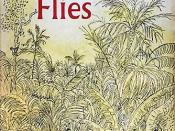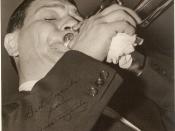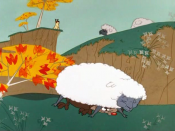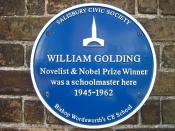In Lord of the Flies, by William Golding, Ralph is a better leader than Jack, and the true leader of the boys. In addition to being elected Leader by the other boys, Ralph had excellent ideas such as the signal fire, and better ways to make more reliable shelters. The fact that Ralph was elected should alone be enough to make his position as Leader apparent. He also devises the only plan for rescue, and makes the well being of the others his top priority, as is demonstrated by the fact that he is the only one to care about the shelters and how reliable they are. All of these qualities mark Ralph as the true leader of the boys.
In Lord of the Flies, by William Golding, Ralph is a better leader than Jack, and the true leader of the boys. In addition to being elected Leader by the other boys, Ralph had excellent ideas such as the signal fire, and better ways to make more reliable shelters.
The fact that Ralph was elected should alone be enough to make his position as Leader apparent. He also devises the only plan for rescue, and makes the well being of the others his top priority, as is demonstrated by the fact that he is the only one to care about the shelters and how reliable they are. All of these qualities mark Ralph as the true leader of the boys.
One of the most important, if not the most important reason that Ralph is the rightful leader is that the other boys elected him chief. In the beginning of the book, the boys saw him as quiet, confidant, and radiating a sense of peaceful authority. Jack also radiated authority, but a very different kind. JackÃÂs authority is based on coercion and manipulation, few if his followers would ever have joined his tribe of their own volition. Even though he nominated himself as a candidate for chief, he is quick to discount the results of the election, because they do not suit him. This is demonstrated by a quote from chapter five: ÃÂIÃÂm chief, I was chosen.ÃÂÃÂWhy should choosing make any difference? Just giving orders that donÃÂt make any sense-ÃÂ (79). Jack is willing to work with the rules when they suit him, but when they do not, he has no problem breaking them, and fracturing the tribe.
Without Ralph, and if it werenÃÂt for the fire in the end, the boys would never have been saved. Jack has no interest in the signal fire; the only goals he pursues are those that offer immediate gratification. Although Jack does carry through with many of his plans and goals, he never places any importance on necessities such as the signal fire, or shelters. Even though Ralph is hungry, and bored with his job as a villager, he never goes hunting with Jack, because he understands how important the fire is, and how important shelters are. Neither of these things offers him any reward, but he keeps at them anyway, because he knows that they are vital to the tribe. Jack disregards these things, as is shown in the quote: ÃÂthere was a ship. Out there. You said youÃÂd keep the fire going, and you let it out!ÃÂ (59). To Jack, these things are not important. If Jack had been elected leader, the boys would have meat, but not much else.
Without the shelters that Ralph builds, they boys would all be cold, wet and probably sick from the cold and wet. Jack works all day for several days to build the shelters, even though almost no one helps him. He cares about the well being of the littluns, and the rest of the tribe even more than he cares about his own. In chapter three, Ralph says, ÃÂIÃÂll come back and go on with the shelterÃÂ (46). Even though he does not want to work on the shelters, he does, even when almost everyone else is going swimming. Even when Jack finishes hunting, and goes for a swim, Jack does not stop, because he knows that they need the shelters by nightfall. Even though he could be doing other things, he keeps working for the well being of all the boys.
All of these attributes, and more, mark Ralph as the true leader. He is, without question, a better leader than Jack. He can lead in the face of adversity, he can lead in war, and, perhaps most importantly, he can lead in peace. He is a leader even when there is no one to lead. He is self reliant, and never gives up, no matter what the cost to himself. In the ending scene, when he is running through the forest, trying to escape from JackÃÂs hunters, he does not lose hope. The concept of defeat does not cross his mind. The only thoughts he has are those of survival, at any cost. This is the same way he looks at his tribe. It is not a question of whether or not they will succeed, the only question is how.
bibliography:Lord of the Flies, by William Golding





